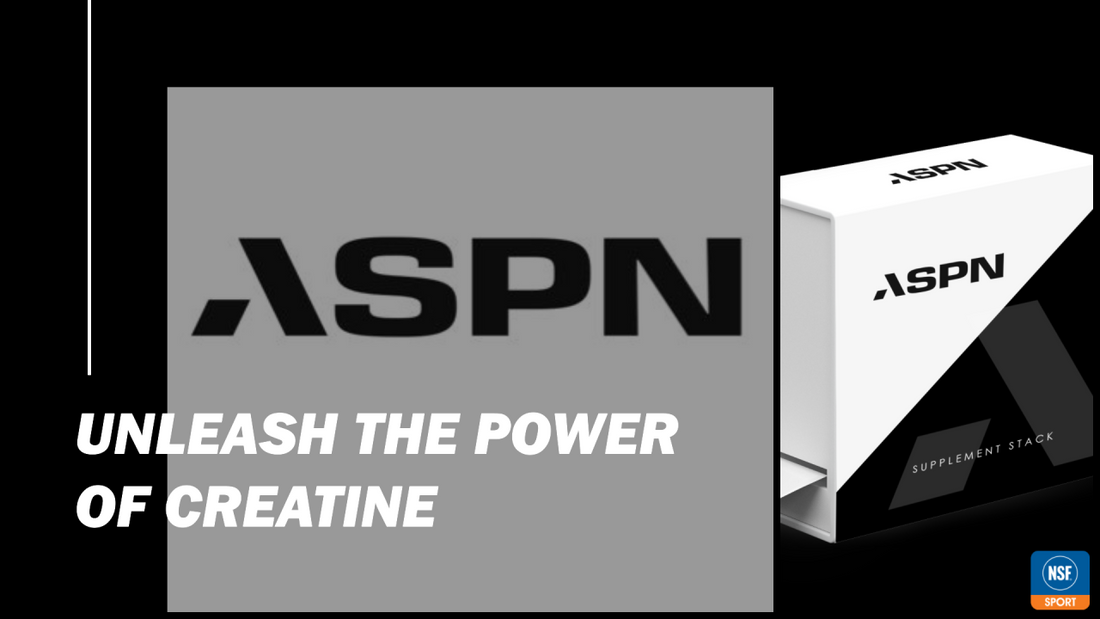
Creatine Uncovered: A Powerful Ally for Brain Health, Recovery, and Performance
Share
When most people think of creatine, they associate it with gym-goers and muscle-building. However, research shows that creatine isn't just a performance booster for physical activities—it's also a powerful ally for brain health. At ASPN Performance, we focus on optimizing mental, physical, and biological performance, and creatine fits seamlessly into this mission.
This article explores the science-backed benefits of creatine for brain health, its role in concussion recovery, and how to incorporate it into your diet naturally.
The Science of Creatine and Brain Health
Creatine is a naturally occurring compound found in small amounts in the body, primarily in muscles and the brain. It plays a crucial role in producing adenosine triphosphate (ATP), the energy currency of cells. While the body synthesizes creatine in the liver, kidneys, and pancreas, dietary intake and supplementation can significantly enhance its availability, particularly in the brain.
Studies suggest that increased creatine levels in the brain can:
- Boost Cognitive Performance: Creatine enhances ATP production, providing a readily available energy source for neurons. Research indicates it may improve memory, focus, and overall cognitive function, especially during mentally demanding tasks or sleep deprivation. (McMorris et al., 2007)
- Support Mental Health: Creatine has shown promise in mitigating symptoms of depression by enhancing brain energy metabolism. (Allen et al., 2010)
- Protect Against Neurological Decline: Creatine supplementation may protect against neurodegenerative diseases like Parkinson's and Alzheimer's by supporting cellular energy metabolism and reducing oxidative stress. (Matthews et al., 1999)
Creatine and Concussion Recovery
One of creatine's most intriguing applications is its potential role in concussion recovery. Concussions and traumatic brain injuries (TBIs) disrupt cellular energy processes in the brain, leading to an energy crisis. Creatine supplementation may help restore energy balance and reduce the secondary damage caused by oxidative stress and inflammation.
Research highlights that creatine supplementation:
- Reduces Brain Energy Deficits: By replenishing ATP, creatine supports the brain’s recovery from energy depletion caused by injury. (Sullivan et al., 2000)
- Minimizes Damage from Oxidative Stress: Creatine acts as an antioxidant, helping to mitigate free radical damage in injured brain tissues.
- Improves Post-Injury Outcomes: Studies on animal models and emerging human research suggest faster recovery and improved neurological outcomes with creatine use following a concussion. (Scheff et al., 2006)
Getting Creatine Through Diet
While creatine supplementation is an efficient way to ensure adequate intake, you can also obtain creatine naturally through your diet. Foods rich in creatine include:
- 1. Meat and Fish:
Beef and pork contain approximately 4-5 grams of creatine per kilogram.
Salmon and tuna offer around 4.5 grams of creatine per kilogram.
- 2. Poultry:
Chicken provides about 3.5 grams of creatine per kilogram.
- 3. Plant-Based Sources:
Although plant-based diets are naturally low in creatine, certain supplements or fortified foods can help vegetarians and vegans meet their needs.
For individuals relying on dietary sources, consuming creatine-rich foods regularly is essential, as cooking can reduce creatine content by up to 30%. Opt for methods like steaming or sous vide to preserve its potency.
Supplementation for Enhanced Benefits
While dietary creatine is beneficial, it’s often challenging to meet optimal levels for brain health through food alone. Supplementation is a safe and effective way to enhance creatine stores in the brain.
- Dosage: A typical dose of 3-5 grams daily is sufficient for most people.
- Safety: Research consistently shows that creatine supplementation is safe for long-term use in healthy individuals. (Persky & Rawson, 2007)
Incorporating Creatine into Your Routine
At ASPN Performance, we emphasize personalized protocols tailored to your unique needs. Whether you're looking to optimize brain function, recover from a concussion, or support long-term neurological health, creatine can be a valuable tool in your arsenal.
Pair creatine supplementation with:
- Proper hydration: Creatine requires water for effective absorption and utilization.
- Neuroprotective foods: Include omega-3 fatty acids, antioxidants, and anti-inflammatory foods to amplify creatine's benefits.
Conclusion
Creatine is far more than a muscle-building supplement. Its ability to support cognitive performance, protect brain health, and aid in concussion recovery makes it a critical component of any performance optimization strategy.
Whether through a balanced diet or supplementation, adding creatine to your routine can unlock new levels of mental and physical resilience. At ASPN Performance, we’re here to guide you in incorporating evidence-based strategies like creatine supplementation into your personalized protocol for optimal performance.
Know the supplements you take are NSF Certified and Third Party Tested with ASPN.
References
- Allen, P. J., D'Anci, K. E., & Kanarek, R. B. (2010). Creatine supplementation and cognitive function. Physiology & Behavior, 99(2), 175-182.
- Matthews, R. T., et al. (1999). Creatine and neuroprotection in neurodegenerative diseases and ischemic brain injury. Amin. Acids, 16(1), 271-283.
- McMorris, T., et al. (2007). Creatine supplementation and cognitive performance in elderly individuals. J. Clin. Psychopharmacol, 27(5), 585-592.
- Sullivan, P. G., et al. (2000). Preservation of mitochondrial function after traumatic brain injury in mice by creatine. J. Neurosci, 20(12), 9262-9269.
- Scheff, S. W., et al. (2006). Creatine as a neuroprotectant in traumatic brain injury. Brain Res, 1128(1), 177-185.
- Persky, A. M., & Rawson, E. S. (2007). Safety of creatine supplementation. Subcell Biochem, 46, 275-289.